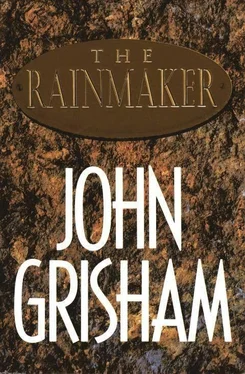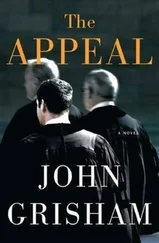Bruiser has not arrived by eight-fifteen. Deck and I are arguing the points made in Drummond’s briefs. Here, where the walls and phones are wired, we discuss nothing but the law.
Eight-thirty, and there’s no sign of Bruiser. He specifically said he’d be here at eight to go over the file. Judge Hale’s courtroom is in the Shelby County Courthouse downtown, twenty minutes away in unpredictable traffic. Deck reluctantly calls Bruiser’s condo, no answer. Dru said she expected him at eight. She tries his car phone, no answer. Maybe he’ll just meet us in court, she says.
Deck and I stuff the file in my briefcase and leave the office at a quarter to nine. He knows the quickest route, he says, so he drives while I sweat. My hands are clammy and my throat is dry. If Bruiser stiffs me on this hearing, I’ll never forgive him. In fact, I’ll hate him forever.
“Relax,” Deck says, hunched over the wheel, zipping around cars and running red lights. Even Deck can look at me and see the fright. “I’m sure Bruiser’ll be there.” He says this without the slightest trace of conviction. “And if he’s not, then you’ll do fine. It’s just a motion. I mean, there’s no jury in the box, you know.”
“Just shut up and drive, Deck, okay. And try not to get us killed.”
“Touchy, touchy.”
We’re downtown, in traffic, and I glance with horror at my watch. It’s nine, straight up. Deck forces two pedestrians off the street, then zips through a tiny parking lot. “You see that door over there,” he says, pointing at the corner of the Shelby County Courthouse, a massive structure that covers an entire city block.
“Yeah.”
“Take it, go up one flight, courtroom is the third door on your right.”
“You think Bruiser’s there?” I ask, my voice quite frail.
“Sure,” he says, lying. He slams on the brakes, hits the curb, and I jump out scrambling. “I’ll be there after I park,” he yells. I bound up a flight of concrete steps, through the door, up another flight, then suddenly I’m in the halls of justice.
The Shelby County Courthouse is old, stately and wonderfully preserved. The floors and walls are marble, the double doors are polished mahogany. The hallway is wide, dark, quiet, and lined with wooden benches under portraits of distinguished jurists.
I slow to a jog, then stop at the courtroom of the Honorable Harvey Hale. Circuit Court Division Eight, according to a brass sign beside the doors.
There’s no sign of Bruiser outside the courtroom, and as I slowly push open the door and look inside, the first thing I don’t see is his huge body. He’s not here.
But the courtroom is not empty. I gaze down the red-carpeted aisle, past the rows of polished and cushioned benches, through the low swinging gate, and I see that quite a few people are waiting for me. Up high, in a black robe, in a large burgundy leather chair, and scowling down my way, is an unpleasant man I presume to be Judge Harvey Hale. A clock on the wall behind him gives the time as twelve minutes after nine. One hand holds his chin while the fingers on the other tap impatiently.
To my left, beyond the bar that separates the spectators’ section from the bench, the jury box and the counsel tables, I see a group of men, all of whom are straining to see me. Amazingly, they all possess the same appearance and dress — short hair, dark suits, white shirts, striped ties, stern faces, contemptible smirks.
The room is silent. I feel like a trespasser. Even the court reporter and bailiff seem to have an attitude.
With heavy feet and rubbery knees, I walk with zero confidence to the gate in the bar. My throat is parched. The words are dry and weak. “Excuse me, sir, but I’m here for the Black hearing.”
The judge’s expression doesn’t change. His fingers keep tapping. “And who are you?”
“Well, my name’s Rudy Baylor. I work for Bruiser Stone.”
“Where’s Mr. Stone?” he asks.
“I’m not sure. He was supposed to meet me here.” There’s a rustling of activity to my left, among the cluster of lawyers, but I don’t look. Judge Hale stops his tapping, raises his chin from his hand and shakes his head in frustration. “Why am I not surprised?” he says into his microphone.
Since Deck and I are bolting, I am determined to flee with the Black case safely in tow. It’s mine! No one else can have it. Judge Hale has no way of knowing at this moment that I’m the lawyer who’ll be prosecuting this case, not Bruiser. As scared as I am, I decide quickly that this is the moment to establish myself.
“I suppose you want a continuance,” he says.
“No sir. I’m prepared to argue the motion,” I say as forcefully as possible. I ease through the gate and place the file on the table to my right.
“Are you a lawyer?” he asks.
“Well, I just passed the bar.”
“But you haven’t received your license?”
I don’t know why this distinction hasn’t hit me until now. I guess I’ve been so proud of myself it just slipped my mind. Plus, Bruiser was going to do the talking today, with me perhaps chiming in for a bit of practice. “No sir. We take the oath next week.”
One of my enemies clears his throat loudly so that the judge will look at him. I turn and see a distinguished gentleman in a navy suit in the process of dramatically rising from his chair. “May it please the court,” he says as if he’s said it a million times. “For the record, my name is Leo F. Drummond of Tinley Britt, counsel for Great Benefit Life.” He says this somberly, up in the direction of his lifelong friend and Yale roommate. The keeper of the record, the court reporter, has returned to her nail filing.
“And we object to this young man’s appearance in this matter.” He sweeps his arms toward me. His words are slow and heavy. I hate him already. “Why, he doesn’t even have a license.”
I hate him for his patronizing tone, and for his silly hairsplitting. This is only a motion, not a trial.
“Your Honor, I’ll have my license next week,” I say. My anger is greatly assisting my voice.
“That’s not good enough, Your Honor,” Drummond says, arms open wide, like this is such a ridiculous idea. The nerve!
“I’ve passed the bar exam, Your Honor.”
“Big deal,” Drummond snaps at me.
I look directly at him. He’s standing in the midst of four other people, three of whom are sitting at his table with legal pads in front of them. The fourth sits behind them. I’m getting the collective glare.
“It is a big deal, Mr. Drummond. Go ask Shell Boykin,” I say. Drummond’s face tightens and there’s a noticeable flinch. In fact, there’s a collective flinch from the defense table.
This is a real cheap shot, but for some reason I couldn’t resist. Shell Boykin is one of two students from our class privileged enough to be hired by Trent & Brent. We despised each other for three years, and we took the exam together last month. His name was not in the newspaper last Sunday. I’m sure the great firm is slightly embarrassed that one of its bright young recruits flunked the bar.
Drummond’s scowl intensifies, and I smile in return. In the few brief seconds that we stand and watch each other, I learn an enormously valuable lesson. He’s just a man. He might be a legendary trial lawyer with lots of notches in his belt, but he’s just another man. He’s not about to step across the aisle and slap me, because I’d whip his ass. He can’t hurt me, and neither can his little covey of minions.
Courtrooms are level from one side to the other. My table is as large as his.
“Sit down!” His Honor growls into the microphone. “Both of you.” I find a chair and take a seat. “One question, Mr. Baylor. Who will handle this case on behalf of your firm?”
Читать дальше












